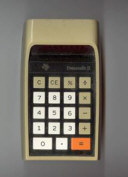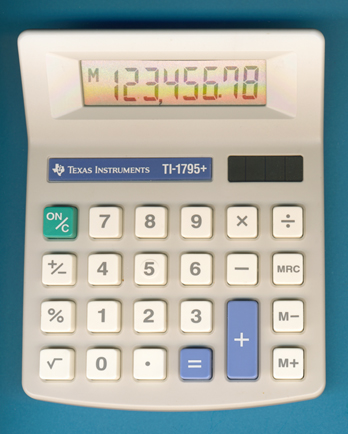
DATAMATH CALCULATOR MUSEUM
 |
DATAMATH CALCULATOR MUSEUM |
Texas Instruments TI-1795+ (Design Sample)
| Date of introduction: | (January 1996) | Display technology: | LCD |
| New price: | Display size: | 8 | |
| Size: | 5.1" x 4.2" x 1.0" 130 x 106 x 26 mm3 |
||
| Weight: | 3.3 ounces, 94 grams | Serial No: | |
| Batteries: | n.a. | Date of manufacture: | mth 06 year 1994 |
| AC-Adapter: | Origin of manufacture: | Taiwan (K) | |
| Precision: | 8 | Integrated circuits: | Sharp LI3154 |
| Memories: | 1 | ||
| Program steps: | Courtesy of: | Joerg Woerner |

![]()
![]()
 At
first glance looks this non-functional TI-1795+ Design Sample almost identical to the first design of the TI-1795+,
main differences are the slightly rounder design of the housing and a new layout
of the keys in the left column.
At
first glance looks this non-functional TI-1795+ Design Sample almost identical to the first design of the TI-1795+,
main differences are the slightly rounder design of the housing and a new layout
of the keys in the left column.

 Dismantling this TI-1795+
Design Sample manufactured already in June 1994 by Kinpo
Electronics in Taiwan reveals a clean design centered around a Sharp LI3154
single-chip calculator circuit soldered on a double-sided printed circuit board
(PCB). We noticed this chip during our research about
so-called Checkbook Calculators with the Radio Shack
EC-455. Learn more about single-chip calculator circuits used in
Account
Manager Calculators.
Dismantling this TI-1795+
Design Sample manufactured already in June 1994 by Kinpo
Electronics in Taiwan reveals a clean design centered around a Sharp LI3154
single-chip calculator circuit soldered on a double-sided printed circuit board
(PCB). We noticed this chip during our research about
so-called Checkbook Calculators with the Radio Shack
EC-455. Learn more about single-chip calculator circuits used in
Account
Manager Calculators.
The
LI3154 is packaged in a standard Flat Pack (FP) housing, a very uncommon approach mid
of the 90s. Most calculators of this era use "Chip-on-Board"
(COB) technology, instead. Please compare it
with a TI-1795+ and TI-7350 manufactured in China,
too. Inventec Corporation on
the other hand manufactured even in 2007 the BA-20
Profit Manager with a conventional Quad Flat Pack (QFP) housing.
 Inspecting the PCB of this TI-1795+ calculator brought our attention to a small mark reading
SD29-10-3, most likely a reference to Type
Small Desktop
2nd Design 9 and Revision 1.03
of the design (schematics and layout). We spotted a very similar PCB-Mark already with the Radio Shack EC-2006A
and Privileg SOLAR 31.
We started compiling a list of the PCB-Marks on calculators
manufactured by OEMs for Texas Instruments.
Inspecting the PCB of this TI-1795+ calculator brought our attention to a small mark reading
SD29-10-3, most likely a reference to Type
Small Desktop
2nd Design 9 and Revision 1.03
of the design (schematics and layout). We spotted a very similar PCB-Mark already with the Radio Shack EC-2006A
and Privileg SOLAR 31.
We started compiling a list of the PCB-Marks on calculators
manufactured by OEMs for Texas Instruments.
![]() The Second
Generation of the TI-1795+ was introduced in January 1996 and
an interesting journey around the Globe began:
The Second
Generation of the TI-1795+ was introduced in January 1996 and
an interesting journey around the Globe began:
| • TI-1795+ Second Generation Prototype
Kinpo Electronics (Taiwan),
June 1994 • TI-1795+ Second Generation Cal-Comp Electronics (Thailand), October 1995 and April 1998 • TI-1795+ Second Generation Nam Tai Electronics (China), May 1998 • TI-1795+ Second Generation Kinpo Electronics (China), August 1998 |
A similar calculator with 10 digits of display capability was sold with the TI-1796+.
![]() Press the X-RAY
button and view the internals of a TI-1795+.
Press the X-RAY
button and view the internals of a TI-1795+.
Look carefully and you'll notice the odd battery compartment!
(Pictures provided by Edward Soudentas)
If you have additions to the above article please email: joerg@datamath.org.
© Joerg Woerner, April 8, 2020. No reprints without written permission.